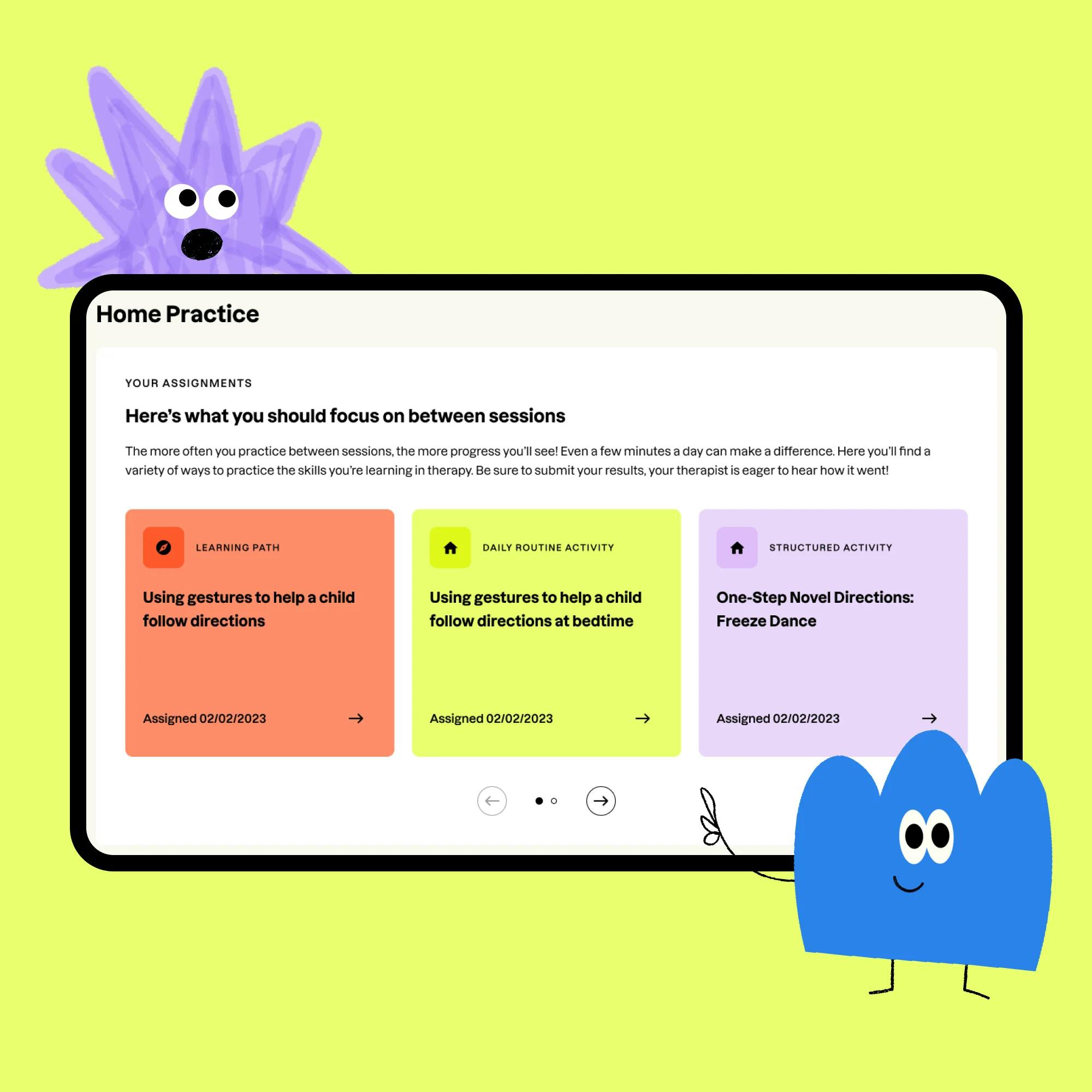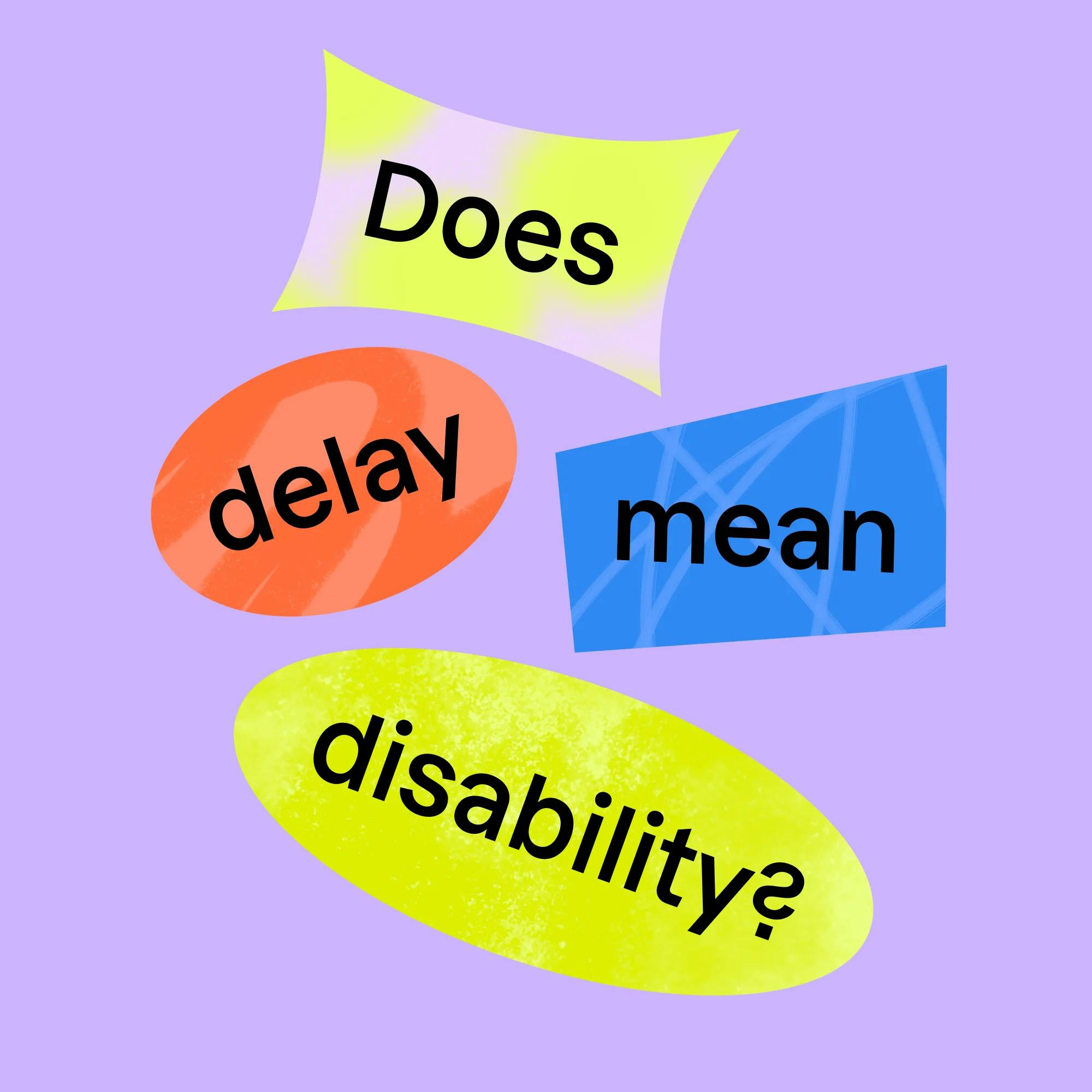Could your toddler or preschooler have a speech delay? We all know that children grow and develop at different rates. So, it’s not always easy to tell whether your child is simply a "late talker" or needs early intervention speech therapy.
That’s where Expressable can help. Our licensed speech therapists have treated thousands of children across the country with speech delays. We’ve put together this informational guide to help you better understand speech delays: the common causes and signs, how a speech delay is diagnosed and treated, and how to help your child with a speech delay at home.
Could your child have a speech delay?
Take our screenerWhat is a speech delay?
Speech and language development begins right after birth. A baby’s coos eventually turn into babbles. And babbling soon progresses to one of the most joyous moments for a parent: their child’s first understandable words.
Toddlers typically begin talking at around 12 months, but you may hear their first words a bit before that, or a bit after. A typical 2-year-old can say about 50 words and speak in two-word sentences. By age 3, their vocabulary increases to as many as 1,000 words.
A speech delay is when a toddler doesn’t meet these typical speech milestones. Speech delays are a common developmental problem that affects as many as 10% of preschool children.
Because all children progress on their own timeline, it can be hard to tell whether your child is just a late talker, or whether there’s more going on that needs support from a professional.
This is why assessment and diagnosis by a certified speech-language pathologist, also known as a speech therapist, is so important. Speech delays can be treated, and research has shown that earlier interventions lead to better outcomes.


What are the signs of a speech delay?
While a speech delay should be diagnosed by a speech therapist, it’s still important for parents to be aware of common signs of a speech delay. This can help you know when it’s time to contact a speech therapist.
Take a look at some signs of speech delay by age:
Signs of speech delay at 12 months
Your child isn't using gestures, such as pointing or waving goodbye
Has trouble imitating sounds
Signs of speech delay at 18 months
Your child prefers making gestures over vocalizations (sounds) to communicate
Has trouble understanding simple verbal requests, such as “Bring me your ball.”
Signs of speech delay at 24 months
Your child can only imitate speech or actions; they don’t say words or phrases on their own
Says only some sounds or words repeatedly, and can't use words to communicate more than their immediate needs
Can't follow simple directions
Signs of speech delay at 36 months
Your child doesn’t use at least 200 words
Doesn’t ask for things by name
Is hard to understand, even if you live with them


What causes a speech delay?
We can't always say exactly what causes a child’s speech delay. However, there are some common factors. Common causes of speech delay include:
Oral impairment: Many kids with speech delays have oral-motor problems, which is a problem in the areas of the brain responsible for speech. This makes it hard to coordinate the lips, tongue, and jaw to make speech sounds. These children also might have other oral-motor problems, such as feeding problems.
Developmental speech and language disorder: Some speech and language disorders are related to a learning disability. Your child may have trouble producing speech sounds, using spoken language to communicate, or understanding what other people are communicating. A speech delay can be the earliest sign of a learning disability.
Hearing loss: A toddler who can’t hear well, or hears distorted speech, is likely to have difficulty forming words. Hearing loss is often overlooked, but fortunately it’s also easily identifiable.
Autism spectrum disorder: Speech, language, and communication problems can be early signs of autism. However, while speech delays are common in autistic children, a speech delay doesn’t automatically mean autism. It’s not always easy to tell the difference between autism and a speech delay. This article explains what to look for.
Neurological problems: Certain neurological problems, like cerebral palsy, muscular dystrophy, and traumatic brain injury, can affect the muscles needed for speaking.
You can get answers to other common questions from parents about speech delay with these articles:


Did I cause my child’s speech delay?
Some parents wonder if something they did caused their child’s speech delay. In extreme cases, neglect, abuse, or traumatic experiences can cause a speech delay. But the short answer is no: In an attentive home where children are engaged with and cared for, speech problems aren’t caused by parents or caregivers. That’s the case no matter how many children you have, and whether or not your child is in daycare, attends preschool, or is homeschooled.
If your child has a speech delay, try to focus on getting them the support they need and learning how to help them at home. As a parent or caregiver, there’s a lot you can do to help your child grow their communication skills!


How are speech delays diagnosed?
If you think your child might have a speech problem, it's important to see a speech therapist. They can determine the cause and, if speech therapy is needed, develop a treatment plan for your child.
During an initial evaluation, the speech therapist will ask about your child’s speech and language skills, as well as other developmental milestones and behaviors. To diagnose a speech delay, your speech therapist will evaluate:
What your child understands (called receptive language)
What your child can say (called expressive language)
Your child’s sound development and how clearly they speak
Your child's oral-motor status (how their mouth, tongue, and lips work together for speech, as well as for eating and swallowing)
The speech therapist will also review your child's medical history and talk with you about your concerns. Based on the results, speech therapy may be recommended for your child.
Concerned about your child's speech?
We're here for you. Get matched with a speech therapist who's experienced in your child's area of need and available when you are.
 Find a speech therapist
Find a speech therapistHow are speech delays treated?
Children and toddlers with speech delays can make excellent progress with the right support from a speech therapist, plus regular practice at home with their parents and caregivers.
Your speech therapist will create a personalized treatment plan that targets measurable goals in each therapy session. The goals will focus on the next step in development for your child.
For some children, this may be imitating words or phrases. For others, it may be learning to participate in a play activity with another person to support joint attention, an essential early skill for language development.
No matter where your child is starting, your speech therapist will guide them through different goals to help them gain new communication skills.
Your speech therapist will also explain how you can practice with your child at home. Regular practice is the key to quicker success in speech therapy! It’s important to practice at home, at school, and when out in the community.
How does online therapy work for a speech delay?
Expressable matches families with a licensed speech therapist trained to evaluate and treat speech delays. All therapy is delivered online via face-to-face video conferencing, at a time that works best with your schedule.
As described above, your Expressable speech therapist will perform a detailed evaluation to determine your child’s current communication strengths and differences. From there, they will build a treatment plan with goals tailored for your child. Your child’s age and development will influence how your speech therapist interacts with them during video sessions:
Ages 0-3: Parents and caregivers attend sessions with their child. You'll work directly with your child's speech therapist to learn cues and at-home strategies. This way you can confidently practice with your child at home and improve your child's communication. Learn more about the importance of parental involvement in children’s speech therapy here, and about the parent coaching model here.
Ages 3-6: Caregivers attend video sessions alongside their child so they both learn valuable skills from their speech therapist. Practicing these skills outside the sessions will continue to promote at-home skill building.
Ages 7 and up: Most children attend video sessions on their own, but caregivers are welcome to attend as well. Your speech therapist will keep you in the loop with updates and tips during each session.


Support beyond sessions: The Expressable Portal
Speech therapy is a partnership between the family and their speech therapist. All Expressable clients have access to our client portal, which is packed with educational videos, tools, and activities covering the strategies taught in therapy sessions. This makes it even easier to practice with your child at home! You can access:
Learning Paths that explain and reinforce new strategies, like how to prompt your child to imitate words or speak in phrases
Demo videos that show real techniques in action
Home practice activities you can do during your everyday routines, like fun games and songs, or tips for practicing during meals or bathtime
Text messaging support with your therapist so you can ask questions, get reminders, or receive tips between sessions
By using the tools in the portal and practicing regularly, your child can make faster progress in learning to talk.


How to support your child with a speech delay at home
Here are some quick tips you can start using today to help your child with their speech at home:
Talk to your child a lot. Do this even if they can’t answer you yet! Even a simple act like narrating what you're doing ("I'm cutting up your grapes!") can be helpful.
Read books aloud. If your kiddo loses interest, then just talk about the pictures.
Sing to your child and provide them with music. Learning new songs helps your child learn new words. It also builds memory skills, listening skills, and expression of ideas with words.
Expand on what your child says. For example, if your toddler says, “truck,” you can say, “The truck is big!”
Describe for your child what they’re doing, feeling, and hearing in the course of the day. For example, “You are hungry” or “You’re playing with your trains!”
Give your child your full attention when they’re talking to you. When you ask them a question, give them enough time to respond before filling in the silence.
Ask your child lots of questions. This gives them opportunities to engage in conversation.
Don’t point out or correct grammar mistakes. Instead, just model good grammar by saying phrases correctly.


Join the Expressable family
If you’re concerned about your child’s speech, we’re here for you! We can match you with a licensed speech therapist who will evaluate your child and help you with the right next steps. Start our easy signup here!
How Expressable Can Help
Concerned your child isn't reaching age-expected milestones? Looking for communication support from a professional? Expressable is a national online speech therapy practice serving children and adults. We treat all major areas of communication and feeding, offer flexible hours including evenings and weekends, and accept most major health insurance plans. We’re proud to have earned more than 3,000 5-star reviews from our clients (4.9/5 average).
Our therapy model is centered on parent and caregiver involvement. Research proves that empowering caregivers to participate in their loved one’s therapy leads to better outcomes. That’s why we combine live, 1-on-1 speech therapy with personalized education and home practice activities for faster progress.
Communication is more than words. It’s how we share how we feel and show who we are. We’re here to help you or your child do just that.
 Abby Barnes, M.S., CCC-SLP
Abby Barnes, M.S., CCC-SLP











